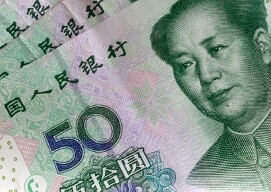The Chinese yuan is mixed against several major currency rivals on Tuesday as investors hold steady and wait out the US-China trade talks. In the meantime, investors are looking at a myriad of reports to find a short-term trading direction for the currency. How much longer can traders hold out hope for a conclusion to the trade spat between the worldâs two largest economies?
This week, an American delegation is in Beijing to discuss a trade agreement. Recently, it was reported that Washington and Beijing would on the cusp of a new trade pact, adding that President Donald Trump and President Xi Jinping would meet for an official signing ceremony in late March. Since then, however, the Trump administration has demanded that China âdouble or tripleâ the total amount it wants to purchase, which could be difficult for the worldâs second-largest economy amid the slowdown. It remains unclear now as to the state of trade talks.
As the trade negotiations linger in the background, numerous other reports have come out in recent days.
According to Boao Forum for Asia (BFA)âs new report, titled âAsian Competitiveness Annual Report 2019,â China was ranked at the ninth competitive economy in Asia for the sixth straight year. China lost out to South Korea, Taiwan, Singapore, Japan, and Hong Kong.
On the data front, offshore borrowing costs surged to a four-month high, and if there is a jump in overnight borrowing costs then it could signal liquidity tightness.
Although Beijing has been instituting across-the-board tax cuts, there has been talk of the federal government implementing a property tax. Senior officials at the annual National Peopleâs Congress revealed that there was a draft of this proposal âsteadily advancing.â
But experts, as well as property developers, assert that the economy is too soft to endure such a tax. Local governments have also been open about their opposition to this type of levy, especially since municipalities depend on land sales for a significant portion of their revenues. It has been reported that local officials would be in charge of the property tax rate.
In any event, this tax would impact not just the real estate industry, but it would also affect property-related sectors, such as cement and steel.
The USD/CNY currency pair rose 0.09% to 6.7157, from an opening of 6.7094, at 20:19 GMT on Tuesday. The EUR/CNY tumbled 0.33% to 7.5649, from an opening of 7.5900.
If you have any questions, comments, or opinions regarding the Chinese Yuan, feel free to post them using the commentary form below.
Chinese Yuan Mixed As Investors Wait Out Trade Talks
